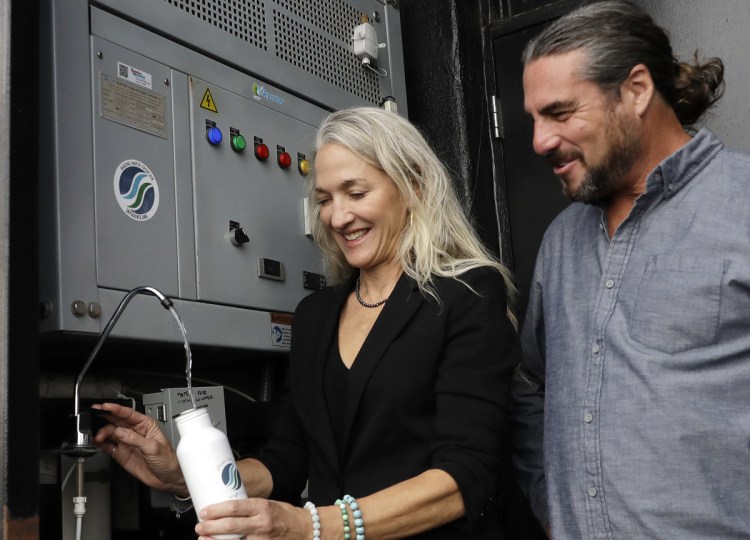LOS ANGELES — It started out modestly enough: David Hertz, having learned that under the right conditions you really can make your own water out of thin air, put a little contraption on the roof of his office and began cranking out free bottles of H2O for anyone who wanted one.
Soon he and his wife, Laura Doss-Hertz, were thinking bigger – so much so that this week the couple won the $1.5 million XPrize For Water Abundance. They prevailed by developing a system that uses shipping containers, wood chips and other detritus to produce as much as 528 gallons of water a day at a cost of no more than 2 cents a quart.
The XPrize competition, created by a group of philanthropists, entrepreneurs and others, has awarded more than $140 million over the years for what it calls audacious, futuristic ideas aimed at protecting and improving the planet. The first XPrize, for $10 million, went to Microsoft co-founder Paul Allen and aviation pioneer Burt Rutan in 2004 for SpaceShipOne, the first privately financed manned space flight.
When Hertz learned a couple of years ago that a prize was about to be offered to whoever could come up with a cheap, innovative way to produce clean freshwater for a world that doesn’t have enough of it, he decided to go all in.
At the time, his little water-making machine was cranking out 150 gallons a day, much of which was being given to homeless people living in and around the alley behind the Studio of Environmental Architecture, Hertz’s Venice Beach-area firm that specializes in creating green buildings.
He and his wife, a commercial photographer, and their partner Richard Groden, who created the smaller machine, assembled The Skysource/Skywater Alliance and went to work. They settled on creating little rainstorms inside shipping containers by heating up wood chips to produce the temperature and humidity needed to draw water from the air and the wood itself.
“One of the fascinating things about shipping containers is that more are imported than exported, so there’s generally a surplus,” said Hertz, adding that they’re cheap and easy to move around.
If there’s no wood chips around for heat, coconut husks, rice, walnut shells, grass clippings or just about any other such waste product will do just fine.
“Certainly in regions where you have a lot of biomass, this is going to be a very simple technology to deploy,” said Matthew Stuber, a professor of chemical and biomolecular engineering at the University of Connecticut and expert on water systems who was one of the panel’s judges.
He called their water-making machine a “really cool” merging of simple technologies that can be used to quickly deliver water to regions hit by natural disasters, stricken by drought or even rural areas with a shortage of clean water.
Hertz and Doss-Hertz are just starting to contemplate how to accomplish that.
Theirs was among 98 teams from 27 countries who entered the competition. Many teams were bigger and better funded, while the couple mortgaged their Malibu home to stay in the game. “If you say we were the dark horse in the race, we weren’t even in the race,” Hertz recalled.
Send questions/comments to the editors.



Success. Please wait for the page to reload. If the page does not reload within 5 seconds, please refresh the page.
Enter your email and password to access comments.
Hi, to comment on stories you must . This profile is in addition to your subscription and website login.
Already have a commenting profile? .
Invalid username/password.
Please check your email to confirm and complete your registration.
Only subscribers are eligible to post comments. Please subscribe or login first for digital access. Here’s why.
Use the form below to reset your password. When you've submitted your account email, we will send an email with a reset code.